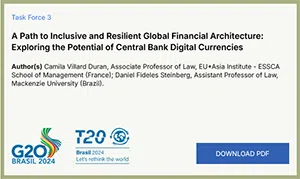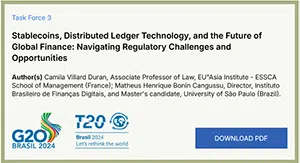We are pleased to announce that Camila Villard Duran, Associate Professor of Law and Member of the EU*Asia Institute at the ESSCA School of Management, has co-authored two policy briefs as part of the Think 20 (T20) Task Force 03 on the ongoing reform of the international financial architecture. T20 brings together think tanks and research centres from G20 countries to provide insights and recommendations on topical global issues.
Camila's contributions reflect her expertise in global economic governance, monetary and financial market regulation, and the evolving structure of digital currencies and crypto-assets. Her policy briefs were co-authored with leading experts from Brazil and demonstrate the collaborative spirit at the heart of the T20's mission. Both briefs aim to rethink the functioning of international financial systems, with a focus on promoting inclusion, resilience and stability through innovative financial solutions.
Task Force 03: Reforming the international financial architecture
Task Force 03 (TF03) focuses on developing policies to ensure the stability of the global financial system and address inequalities between the global North and South. It addresses key issues such as financial regulation and global financial safety nets and contributes to the work of several G20 groups, including the Working Group on International Financial Architecture.
Camila's policy briefs
A path to inclusive and resilient global financial architecture: Exploring the potential of Central Bank Digital Currencies
In this brief, co-authored with Daniel Fideles Steinberg of Mackenzie University (Brazil), Camila explores the potential of central bank digital currencies (CBDCs) to reshape the international monetary system. Currently, the system is heavily dependent on the US dollar and its associated financial infrastructure, which often leads to imbalances during financial crises. The report examines how multi-CBDC platforms led by the Bank for International Settlements (BIS) could enable direct currency exchange between central banks, reducing reliance on US dollar liquidity and increasing the monetary autonomy of nations. The authors argue in favour of a solid governance framework and expanded access to ensure a more inclusive and resilient global financial system.
Stablecoins, distributed ledger technology, and the future of global finance: Navigating regulatory challenges and opportunities
In collaboration with Matheus Henrique Bonin Cangussu of the Instituto Brasileiro de Finanças Digitais, Camila examines the role of stablecoins - crypto-assets designed to minimise price volatility - within distributed ledger technology (DLT) platforms. The brief highlights the regulatory challenges posed by stablecoins, given their cross-border nature and the lack of a harmonised regulatory framework. The authors propose the development of comprehensive data collection systems and harmonised regulations to support the secure integration of stablecoins into the global financial system, increase transparency and mitigate risks.
Outlook
Camila's contributions to the T20 provide important input to the ongoing global dialogue on the future of finance. Her work not only addresses the challenges of the current international financial architecture, but also presents actionable solutions for creating a fairer and more sustainable system. As global discussions on digital currencies and financial regulation evolve, the insights contained in these policy briefs are likely to shape the future of global financial governance.







